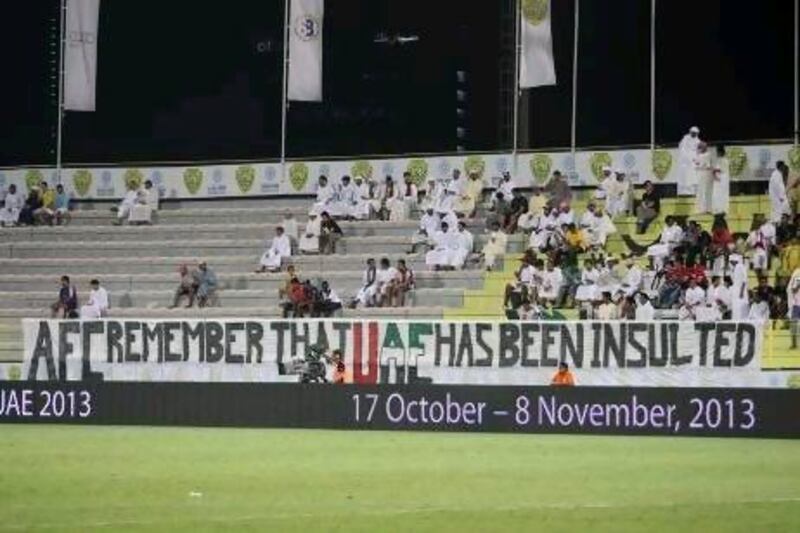When a hapless editor from the Asian Football Confederation's (AFC) website decided to cut a corner by using Wikipedia for information on the UAE national team, little did he realise his irresponsible act would lead to an international incident that threatened to damage relations between the AFC and the Football Association.
The response to the website's use of "Sand Monkeys" as a nickname for the Emirati football team was swift and continued after the AFC had belatedly apologised.
"To those who called us Sand Monkeys, we are Zayed's lions," read the banner which the country's footballers displayed before the 6-2 thrashing of Bahrain on Tuesday night in Dubai was complemented by similar ones by supporters in the stands.
While the mistake was an act of ineptitude on behalf of the AFC website moderators, the incident should not overshadow some of the more serious issues within the Asian game. Nor derail the progress of Emirati football.
Thankfully, commonsense seems to have prevailed. Once the displeasure was highlighted on Tuesday, Mahdi Ali, the UAE coach, showed commendable perspective by calling for an end to the episode.
"We don't want to exaggerate about the event," he said. "There was a mistake and the AFC have sent an official letter of apology."
Certainly, initial threats by the FA to withdraw from the AFC were hasty and the consequences for UAE football would have been unthinkable.
With Yousuf Al Serkal, the president of the FA, expected to run for the position of AFC president next year, the incident would have increased tension in the corridors of power at the AFC's headquarters in Kuala Lumpur.
The acting president, China's Zhang Jilong, in charge since former chief Mohamed bin Hammam of Qatar was suspended over corruption allegations, is also facing competition from Bahrain's Sheikh Salman bin Ibrahim, who, in 2009, made an unsuccessful bid to replace bin Hammam on Fifa's executive committee.
Asian football could do with some stability at a time when its reputation has taken a battering - from the controversy surrounding bin Hammam and a number of match-fixing cases.
Bin Hammam was banned from worldwide football activities by Fifa's Ethics Committee in July 2011 for his alleged attempt to bribe Caribbean officials in his bid to become Fifa president.
Although that suspension was lifted last July by the Court of Arbitration for Sport (CAS) in Switzerland, the repercussions for bin Hammam continued.
Prior to CAS's decision, the AFC itself temporarily suspended him after an internal audit revealed new allegations of corruption.
In the meantime, Zhang was proving to be a smart political schemer. In February, with bin Hammam's appeal in progress, Zhang revealed he was planning to run for the presidency should the suspension stand. And then, days before the appeal, he diplomatically called for unity.
"A sense of togetherness and unity of purpose has never been more important in Asian football," Zhang told the AFC's executive committee.
How long this unity of purpose lasts remains to be seen.
Whoever wins the presidency, with elections taking place in May 2013, tackling the issues of corruption within the AFC - as well as bribery and match-fixing allegations in the Far East - need to be tackled.
In 2011, 39 footballers from South Korea's K-League were given prison sentences for their roles in match-fixing.
This year, the former head of China's FA, along with former national team players, were sentenced to 10 years in prison for accepting bribes and fixing matches.
These are just two of several high profile cases in Asia over the past two decades.
When Al Serkal announced his intention to run for the AFC presidency last year, he stressed the importance of transparency, eliminating financial wrong-doing and cleaning up the organisation's image.
Rather than ignore the problem, Al Serkal has acknowledged that corruption is rampant in football among players, referees and officials, while Fifa, the game's governing body, have often downplayed the extent of the problem.
The AFC needs to confront these problems head on. Certainly Zhang remains strong favourite to win the presidency, when the AFC congress takes place in May next year, but whoever takes over - Zhang, Al Serkal or another candidate - must realise corruption is a stain on the game, one that must be eradicated sooner rather than later.
The unfortunate UAE nickname incident will, hopefully, soon be forgotten. But the spectre of corruption looms over our game until it is stamped out.
Follow us
[ @SprtNationalUAE ]





